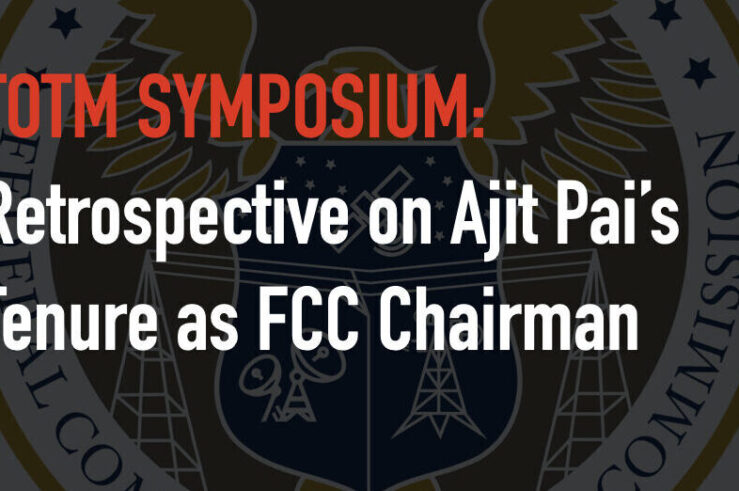Showing results for: “premium natural and organic”
For Scotch Whisky, Age Is Just A Number
For a potential entrepreneur, just how much time it will take to compete, and the barrier to entry that time represents, will vary greatly depending on the market he or she wishes to enter. A would-be competitor to the likes of Subway, for example, might not find the time needed to open a sandwich shop ... For Scotch Whisky, Age Is Just A Number
Going Back to Antitrust Basics
Advocates of legislative action to “reform” antitrust law have already pointed to the U.S. District Court for the District of Columbia’s dismissal of the state attorneys general’s case and the “conditional” dismissal of the Federal Trade Commission’s case against Facebook as evidence that federal antitrust case law is lax and demands correction. In fact, the ... Going Back to Antitrust Basics
The Virtues and Pitfalls of Economic Models
Interrogations concerning the role that economic theory should play in policy decisions are nothing new. Milton Friedman famously drew a distinction between “positive” and “normative” economics, notably arguing that theoretical models were valuable, despite their unrealistic assumptions. Kenneth Arrow and Gerard Debreu’s highly theoretical work on General Equilibrium Theory is widely acknowledged as one of ... The Virtues and Pitfalls of Economic Models
The Supreme Court Misses the Big Consumer Welfare Picture in NCAA v. Alston
In its June 21 opinion in NCAA v. Alston, a unanimous U.S. Supreme Court affirmed the 9th U.S. Circuit Court of Appeals and thereby upheld a district court injunction finding unlawful certain National Collegiate Athletic Association (NCAA) rules limiting the education-related benefits schools may make available to student athletes. The decision will come as no ... The Supreme Court Misses the Big Consumer Welfare Picture in NCAA v. Alston
Against the Jones Act
Economist Josh Hendrickson asserts that the Jones Act is properly understood as a Coasean bargain. In this view, the law serves as a subsidy to the U.S. maritime industry through its restriction of waterborne domestic commerce to vessels that are constructed in U.S. shipyards, U.S.-flagged, and U.S.-crewed. Such protectionism, it is argued, provides the government ... Against the Jones Act
The FTC Did Not ‘Fumble the Future’ in Its Google Search Investigation
Politico has released a cache of confidential Federal Trade Commission (FTC) documents in connection with a series of articles on the commission’s antitrust probe into Google Search a decade ago. The headline of the first piece in the series argues the FTC “fumbled the future” by failing to follow through on staff recommendations to pursue ... The FTC Did Not ‘Fumble the Future’ in Its Google Search Investigation
The Problem of Data Property Rights
Policy discussions about the use of personal data often have “less is more” as a background assumption; that data is overconsumed relative to some hypothetical optimal baseline. This overriding skepticism has been the backdrop for sweeping new privacy regulations, such as the California Consumer Privacy Act (CCPA) and the EU’s General Data Protection Regulation (GDPR). ... The Problem of Data Property Rights
Investors and Regulators Can Both Fall for Platform Bubbles
In current discussions of technology markets, few words are heard more often than “platform.” Initial public offering (IPO) prospectuses use “platform” to describe a service that is bound to dominate a digital market. Antitrust regulators use “platform” to describe a service that dominates a digital market or threatens to do so. In either case, “platform” denotes power ... Investors and Regulators Can Both Fall for Platform Bubbles
How Antitrust Regulators Could Use the ‘Perpetual Inventory Method’ to Value R&D
The slew of recent antitrust cases in the digital, tech, and pharmaceutical industries has brought significant attention to the investments many firms in these industries make in “intangibles,” such as software and research and development (R&D). Intangibles are recognized to have an important effect on a company’s (and the economy’s) performance. For example, Jonathan Haskel ... How Antitrust Regulators Could Use the ‘Perpetual Inventory Method’ to Value R&D
Great Job, Kid! (And Welcome to the Private Sector)
Many thanks to Geoffrey Manne for this opportunity to memorialize a few thoughts I have about Ajit’s service on the Federal Communications Commission. My remarks will be more about Ajit as a person rather than the substance and long laundry list of his accomplishments as chair. Others will do that, I’m sure. The first memory ... Great Job, Kid! (And Welcome to the Private Sector)
The DOJ’s Antitrust Case Against Google: A Tough Slog, but Maybe an Intriguing Possibility?
The U.S. Department of Justice’s (DOJ) antitrust case against Google, which was filed in October 2020, will be a tough slog.[1] It is an alleged monopolization (Sherman Act, Sec. 2) case; and monopolization cases are always a tough slog. In this brief essay I will lay out some of the issues in the case and raise ... The DOJ’s Antitrust Case Against Google: A Tough Slog, but Maybe an Intriguing Possibility?
Why the Federal Government’s Antitrust Case Against Google Should—and Likely Will—Fail
On October 20, 2020, the U.S. Department of Justice (DOJ) and eleven states with Republican attorneys general sued Google for monopolizing and attempting to monopolize the markets for general internet search services, search advertising, and “general search text” advertising (i.e., ads that resemble search results). Last week, California joined the lawsuit, making it a bipartisan ... Why the Federal Government’s Antitrust Case Against Google Should—and Likely Will—Fail














